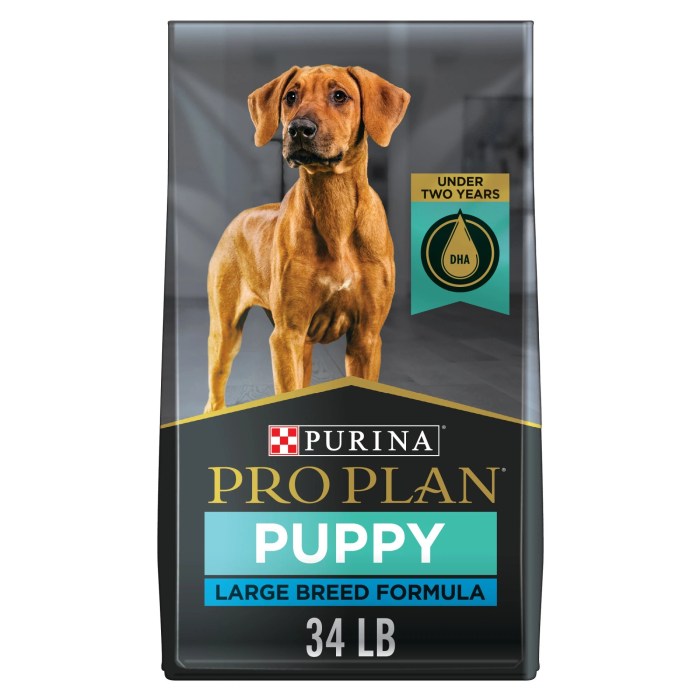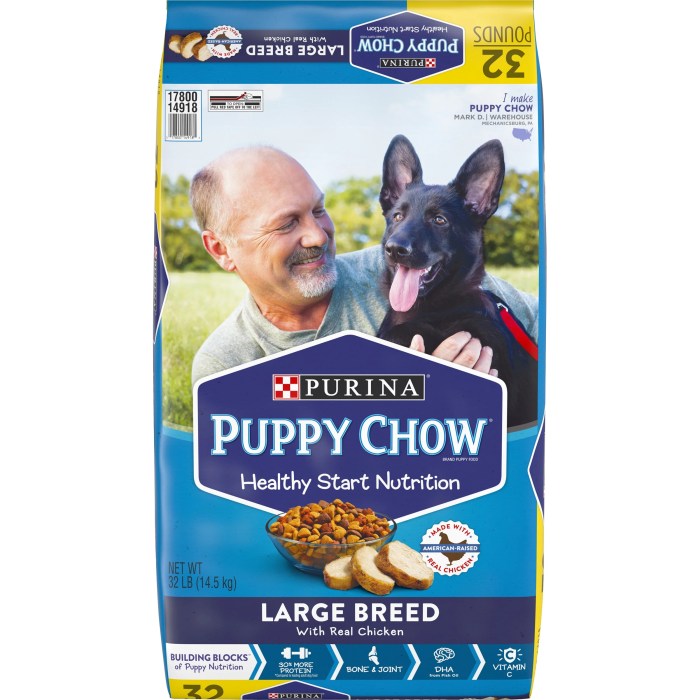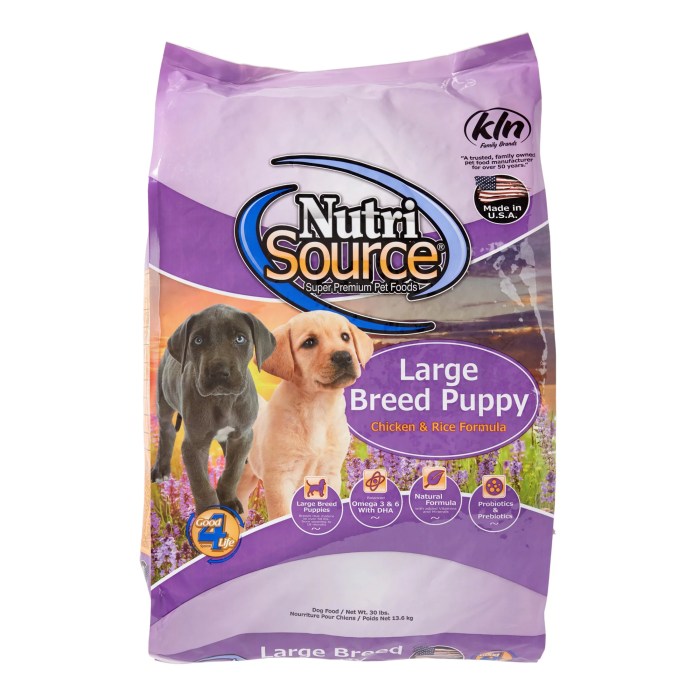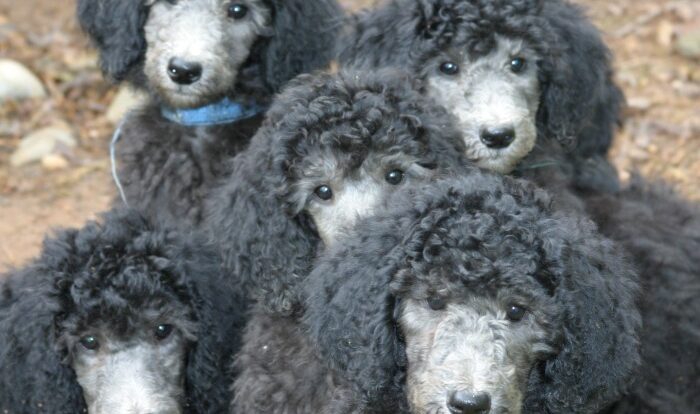Large breed puppy dog food sets the foundation for your furry friend’s health and well-being, ensuring they grow up strong and happy. Dive into the world of nutrition tailored specifically for these growing pups.
When it comes to feeding your large breed puppy, making the right choice is crucial for their development and overall health.
Overview of Large Breed Puppy Dog Food
Large breed puppy dog food is specifically formulated to meet the unique nutritional needs of puppies that will grow into large dogs. It is important to choose the right food for large breed puppies to support their growth and development properly.
Nutritional Needs of Large Breed Puppies
Large breed puppies have different nutritional requirements compared to smaller breeds due to their rapid growth rate and potential for musculoskeletal issues. They need a balanced diet that promotes slow, steady growth to reduce the risk of developmental orthopedic diseases.
- Protein: Large breed puppy food should contain high-quality protein sources like chicken, lamb, or fish to support muscle development.
- Calcium and Phosphorus: These minerals are essential for bone growth, but the levels need to be controlled to prevent skeletal abnormalities.
- Glucosamine and Chondroitin: These ingredients help support joint health, which is crucial for large breed puppies prone to hip dysplasia and other joint issues.
- Omega-3 Fatty Acids: Found in ingredients like fish oil, omega-3 fatty acids support brain development and promote a healthy coat and skin.
Factors to Consider When Choosing Large Breed Puppy Dog Food
When selecting the best food for your large breed puppy, there are several important factors to keep in mind to ensure their overall health and well-being.
Importance of Size and Growth Rate
Large breed puppies have specific nutritional needs due to their size and rapid growth rate. It is crucial to choose a puppy food that is specifically formulated to support their development and prevent issues such as bone and joint problems.
Significance of Protein Levels
Protein is essential for muscle development in large breed puppies. Look for puppy foods with high-quality protein sources like chicken, lamb, or fish to help support your puppy’s growth and energy levels.
Controlled Calcium and Phosphorus Levels
Large breed puppies are prone to skeletal issues like hip dysplasia, so it’s important to choose a food with controlled levels of calcium and phosphorus. Excessive amounts of these minerals can lead to abnormal bone growth and potential health issues.
Grain-Free vs. Grain-Inclusive Options
When it comes to choosing between grain-free and grain-inclusive options for large breed puppies, it ultimately depends on your puppy’s individual needs and sensitivities. Grain-free options may be beneficial for puppies with allergies or sensitivities, while grain-inclusive options can provide essential nutrients and fiber for overall digestion and health.
Types of Large Breed Puppy Dog Food

When it comes to feeding large breed puppies, there are several types of dog food to consider. Each type has its own benefits and drawbacks, so it’s important to choose the best option for your furry friend.
Dry Kibble
Dry kibble is a popular choice for large breed puppies due to its convenience and affordability. It helps with dental health by reducing plaque and tartar buildup. However, some dry kibbles may contain fillers and artificial ingredients that are not ideal for your puppy’s health. Look for brands like Royal Canin Large Breed Puppy, Hill’s Science Diet Large Breed Puppy, or Blue Buffalo Life Protection Formula Large Breed Puppy for high-quality options.
Wet Food
Wet food is another option for large breed puppies, offering higher moisture content and a more palatable texture. It can be beneficial for picky eaters or puppies with dental issues. However, wet food is typically more expensive than dry kibble and can contribute to dental problems if not supplemented with dry food. Consider brands like Wellness CORE Grain-Free Large Breed Puppy, Merrick Grain-Free Puppy Plate, or Taste of the Wild High Prairie Puppy Formula for nutritious wet food options.
Raw Diet
A raw diet consists of uncooked meat, bones, fruits, and vegetables, mimicking a dog’s natural diet in the wild. This type of food can provide essential nutrients and promote dental health. However, a raw diet requires careful preparation to ensure balanced nutrition and can be more expensive than commercial dog food. If you choose to feed your large breed puppy a raw diet, consult with a veterinarian to create a safe and balanced meal plan.
Transitioning to a New Type of Food
When transitioning your large breed puppy to a new type of food, do so gradually over 7-10 days. Start by mixing a small amount of the new food with the old food and gradually increase the ratio of new to old food. This gradual transition helps prevent digestive upset and allows your puppy to adjust to the new food more easily.
Feeding Guidelines for Large Breed Puppy Dog Food
Feeding a large breed puppy correctly is crucial for their growth and development. It is essential to follow specific guidelines to ensure they receive the proper nutrition they need at each stage of their growth.
Frequency of Feeding
For large breed puppies, it is recommended to feed them 3-4 times a day when they are between 8-12 weeks old. As they grow older, you can gradually reduce the frequency to 2-3 times a day until they reach adulthood. This helps in preventing digestive issues and maintains a steady energy level throughout the day.
Portion Sizes
It is important to determine the right portion sizes for large breed puppies based on their age, weight, and activity level. A general guideline is to follow the instructions on the dog food packaging and adjust as needed. Monitor your puppy’s weight and body condition regularly to ensure they are getting the right amount of food.
Weight Monitoring and Adjustments
Regularly monitor your large breed puppy’s weight to ensure they are growing at a healthy rate. If you notice rapid weight gain or loss, adjust their food intake accordingly. Overfeeding can lead to obesity and joint issues, while underfeeding can result in stunted growth and nutritional deficiencies.
Feeding Schedule
Create a feeding schedule that works for both you and your puppy. Stick to consistent meal times and avoid free-feeding to maintain a routine. This helps in regulating their digestion and prevents overeating. Remember to provide fresh water at all times to keep your puppy hydrated.
Health Considerations for Large Breed Puppy Dog Food
When it comes to the health of large breed puppies, the type of food they consume plays a crucial role in their overall well-being. Here are some important factors to consider:
Common Health Issues for Large Breed Puppies
- Joint problems: Large breed puppies are prone to joint issues such as hip dysplasia and arthritis. Feeding them the right food can help support their joint health and prevent these issues.
- Obesity: Overfeeding or feeding the wrong type of food can lead to obesity in large breed puppies, which can put strain on their joints and lead to other health problems.
Role of Supplements in a Large Breed Puppy’s Diet
- Supplements like glucosamine and chondroitin can help support joint health in large breed puppies. Omega-3 fatty acids are also beneficial for their skin, coat, and overall health.
- It’s important to consult with a veterinarian before adding any supplements to your puppy’s diet to ensure they are safe and appropriate.
Impact of Food Quality on Joint Health
- High-quality dog food specifically formulated for large breed puppies typically contains balanced levels of nutrients like calcium and phosphorus to support healthy bone and joint development.
- Avoiding excessive calcium intake is crucial, as it can lead to skeletal issues in large breed puppies. Look for food with controlled calcium levels for optimal bone health.
Choosing Food to Support the Immune System
- Selecting dog food with added antioxidants, vitamins, and minerals can help boost a large breed puppy’s immune system and protect them from common illnesses.
- Look for formulas that include ingredients like vitamin E, vitamin C, and beta-carotene to support your puppy’s overall health and well-being.
Ingredients to Avoid in Large Breed Puppy Dog Food
When choosing food for your large breed puppy, it’s essential to be aware of certain ingredients that can be harmful to their health. These ingredients can have a negative impact on their growth and overall well-being. Here are some ingredients to avoid in large breed puppy dog food:
Artificial Preservatives
Artificial preservatives such as BHA, BHT, and ethoxyquin are commonly used in pet food to extend shelf life. However, these preservatives have been linked to health issues in dogs, including cancer and organ damage. It is best to opt for natural preservatives like tocopherols (vitamin E) instead.
Artificial Colors and Flavors
Artificial colors and flavors are often added to make the food more visually appealing and palatable. However, these additives offer no nutritional value and can potentially cause allergic reactions and behavioral issues in large breed puppies. Look for food that uses natural sources for color and flavor, such as fruits and vegetables.
Fillers and By-Products
Fillers like corn, wheat, and soy are often used in dog food to bulk up the product and reduce costs. These ingredients offer little to no nutritional value and can lead to digestive issues in large breed puppies. By-products are also best avoided as they are low-quality protein sources and may contain harmful substances.
Excessive Fat and Salt
Large breed puppies have specific nutritional needs, and excessive fat and salt content in their food can lead to obesity, heart problems, and other health issues. It’s important to choose a balanced diet that meets their requirements without unnecessary added fats and salts.
Reading Ingredient Labels
When selecting food for your large breed puppy, always read the ingredient labels carefully. Look for high-quality protein sources like meat or fish, whole grains, and natural sources of vitamins and minerals. Avoid products with long lists of unrecognizable ingredients and opt for transparency in labeling.
Budget-Friendly Options for Large Breed Puppy Dog Food
When looking for budget-friendly options for large breed puppy dog food, it’s important to consider both the immediate costs and the long-term expenses involved in feeding your growing pup. While quality should never be compromised, there are ways to find affordable yet high-quality food options for your large breed puppy.
Comparing Prices and Brands
When comparing prices and brands of large breed puppy dog food, consider looking for store brands or generic options that still meet the nutritional needs of your puppy. Some well-known brands may offer budget-friendly lines specifically tailored for large breed puppies. Additionally, buying in bulk or taking advantage of sales and discounts can help reduce costs without sacrificing quality.
Considering Long-Term Costs
While it may be tempting to opt for the cheapest large breed puppy dog food available, it’s essential to consider the long-term costs associated with your choice. Investing in high-quality food now can potentially save you money on veterinary bills and health issues down the line. Look for food that is formulated to support the specific needs of large breed puppies to promote healthy growth and development.
Where to Purchase Cost-Effective Food
To find cost-effective large breed puppy dog food, consider shopping at warehouse clubs, online retailers, or pet supply stores that offer discounts or loyalty programs. Keep an eye out for promotions, coupons, and subscription services that can help you save money on your puppy’s food. Additionally, purchasing in larger quantities can often result in lower costs per serving.
Homemade vs. Commercial Large Breed Puppy Dog Food
When it comes to deciding between homemade and commercial large breed puppy dog food, there are various factors to consider to ensure your furry friend’s health and well-being. Both options have their own set of benefits and risks, so it’s essential to weigh them carefully before making a decision.
Commercial large breed puppy dog food is formulated to meet the specific nutritional needs of growing puppies, making it a convenient and easy option for pet owners. These foods undergo rigorous testing to ensure they provide the right balance of nutrients essential for your puppy’s development. Additionally, commercial dog food often comes in various flavors and textures, catering to different preferences.
On the other hand, homemade large breed puppy dog food allows pet owners to have more control over the ingredients that go into their pet’s diet. This option can be beneficial for dogs with specific dietary requirements or allergies. However, preparing homemade dog food can be challenging, as it requires a deep understanding of canine nutrition to ensure your puppy receives all the necessary nutrients.
Nutritional Challenges of Homemade Food for Large Breed Puppies
Preparing homemade food for large breed puppies can be challenging due to the need to provide a well-balanced diet that meets all their nutritional requirements. Some of the key challenges include:
- Ensuring the right balance of protein, carbohydrates, fats, vitamins, and minerals.
- Understanding the specific dietary needs of large breed puppies, such as proper calcium and phosphorus levels to support healthy bone growth.
- Avoiding ingredients that are harmful to dogs, such as onions, garlic, grapes, and chocolate.
Ensuring a Homemade Diet Meets a Large Breed Puppy’s Nutritional Requirements
To ensure that a homemade diet meets a large breed puppy’s nutritional requirements, it’s essential to:
- Consult with a veterinarian or pet nutritionist to create a balanced diet plan tailored to your puppy’s needs.
- Incorporate a variety of high-quality protein sources, such as lean meats, fish, and eggs.
- Add fruits and vegetables to provide essential vitamins and minerals.
- Include healthy fats, such as fish oil or flaxseed oil, to support your puppy’s skin and coat health.
- Monitor your puppy’s weight and overall health regularly to make any necessary adjustments to their diet.
Guidelines on Consulting a Veterinarian or Nutritionist
When considering a homemade diet for your large breed puppy, it’s crucial to seek guidance from a veterinarian or pet nutritionist. These professionals can help you:
- Assess your puppy’s specific nutritional needs based on their breed, size, age, and activity level.
- Create a customized diet plan that ensures your puppy receives all the essential nutrients for optimal growth and development.
- Monitor your puppy’s progress and make any necessary adjustments to their diet to address any nutritional deficiencies or imbalances.
Training Tips Using Large Breed Puppy Dog Food
When it comes to training your large breed puppy, using food as a reward can be a highly effective method. Food rewards can help reinforce positive behavior and encourage your puppy to learn new commands quickly.
Importance of Using Treats Appropriately
Using treats during training sessions is crucial for keeping your puppy motivated and engaged. However, it’s essential to use treats in moderation to prevent overfeeding and maintain a healthy diet for your large breed puppy.
- Use small, bite-sized treats to prevent overfeeding and keep your puppy focused during training sessions.
- Choose high-quality treats that are nutritious and delicious to make training more rewarding for your puppy.
- Avoid using treats as a substitute for regular meals to ensure your puppy receives a balanced diet.
Training Exercises with Food Rewards, Large breed puppy dog food
Incorporating food rewards into training exercises can make the learning process enjoyable for your puppy. Here are some examples of training exercises that involve using food rewards:
- Basic obedience commands like sit, stay, and come
- Leash training and walking on a loose leash
- Crate training and housebreaking
Maintaining a Healthy Balance
It’s important to strike a balance between using treats for training and providing regular meals for your large breed puppy. Here’s how you can maintain a healthy balance:
Use treats sparingly during training sessions and adjust your puppy’s regular meals accordingly to prevent overfeeding.
Monitor your puppy’s weight and adjust treat portions as needed to prevent excessive calorie intake.
Consult with your veterinarian to develop a training and feeding plan that suits your large breed puppy’s specific needs.
Reviews and Recommendations for Large Breed Puppy Dog Food

When it comes to choosing the best large breed puppy dog food, it can be helpful to consider reviews and recommendations from other pet owners who have experience feeding their dogs. These insights can provide valuable information about the nutritional value, taste, and overall quality of different brands of large breed puppy food.
Insights from Pet Owners
- Consider reaching out to fellow pet owners, veterinarians, or online forums to gather reviews and recommendations on large breed puppy dog food brands.
- Look for feedback on factors such as palatability, digestibility, coat health, energy levels, and overall well-being of the puppies.
- Pay attention to reviews from owners of similar large breed puppies to get a better idea of what might work best for your dog.
Recommendations Based on Nutritional Value
- Opt for large breed puppy dog food that is specifically formulated to meet the nutritional needs of growing large breed puppies.
- Choose brands that include high-quality proteins, essential vitamins and minerals, and balanced levels of fats and carbohydrates.
- Consider consulting with a veterinarian for personalized recommendations based on your puppy’s specific dietary requirements.
Researching and Evaluating Reviews
- Look for reviews from reputable sources such as pet food review websites, veterinary recommendations, and trusted online retailers.
- Compare reviews across multiple platforms to get a well-rounded understanding of the pros and cons of different large breed puppy dog food brands.
- Take individual preferences and dietary restrictions into account when evaluating reviews to ensure the best fit for your puppy.
Considering Individual Preferences and Requirements
- Keep in mind that each puppy is unique and may have different preferences when it comes to taste and texture of food.
- Consider any dietary restrictions or allergies your puppy may have when selecting a large breed puppy dog food brand.
- Take into account your puppy’s activity level, size, breed, and overall health when choosing the most suitable food for them.
Storage and Handling Tips for Large Breed Puppy Dog Food

Proper storage and handling of large breed puppy dog food are essential to maintain its freshness and nutritional value. Here are some guidelines to help you ensure the quality and safety of the food for your furry friend.
Proper Storage of Large Breed Puppy Dog Food
- Store the food in a cool, dry place away from direct sunlight to prevent spoilage and maintain the nutritional content.
- Keep the food in its original packaging or an airtight container to preserve its freshness and prevent exposure to moisture.
- Check the expiration date on the packaging and discard any expired food to avoid feeding your puppy spoiled or potentially harmful food.
Handling and Serving Large Breed Puppy Dog Food Safely
- Wash your hands before handling the food to prevent contamination.
- Use clean bowls and utensils to serve the food and wash them regularly to prevent bacterial growth.
- Follow the recommended feeding guidelines to ensure your puppy receives the right amount of nutrition for their growth and development.
Organizing and Rotating Food Supplies
- Organize your food supplies by labeling them with the purchase date to keep track of freshness and prevent feeding expired food accidentally.
- Rotate the food supplies by using older bags or containers first to maintain freshness and prevent food waste.
- Store opened bags of food in a resealable container to prevent exposure to air and moisture, which can lead to spoilage.
Closing Summary
In conclusion, providing the best nutrition for your large breed puppy is key to setting them up for a vibrant and active life. By understanding their unique dietary needs, you can ensure your furry companion thrives every step of the way.






